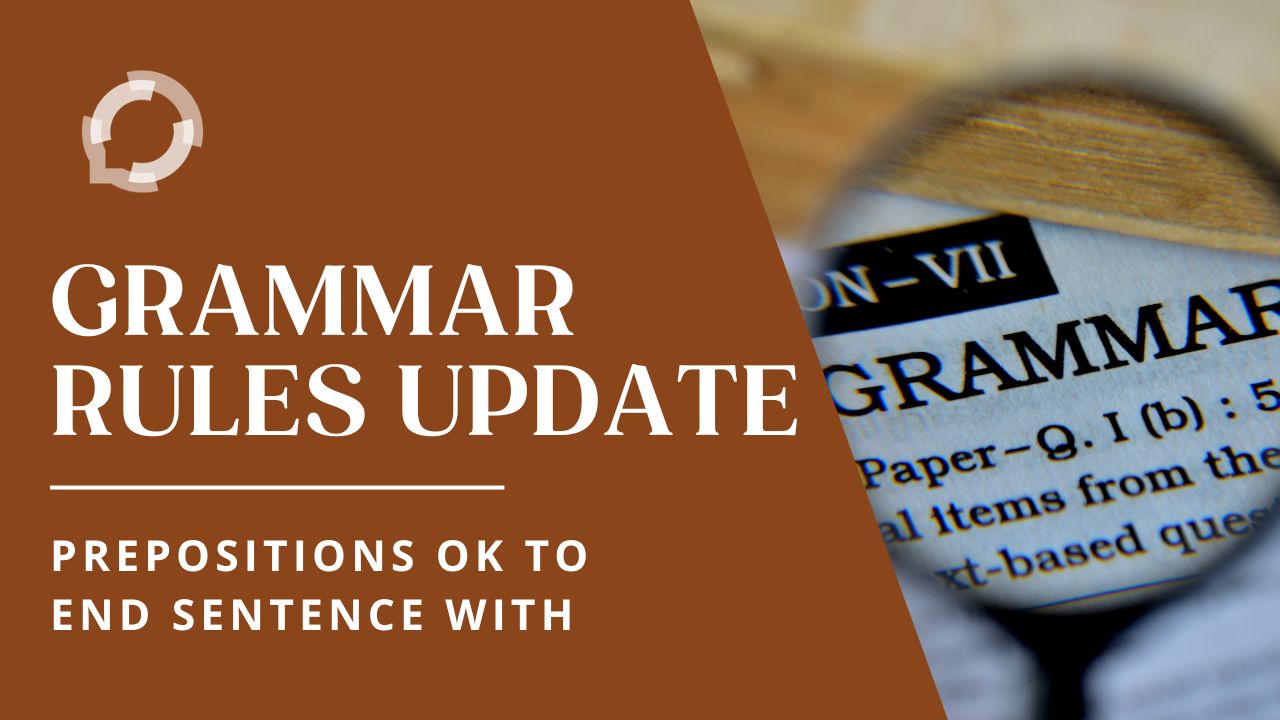Earlier this week, did you hear the grammar news that Merriam-Webster Dictionary was talking about? NPR also had a piece on it which you might have heard of. It’s the kind of internet-breaking news that everyone needs to make their own peace with. If you don’t like changing long-held rules for speaking and writing in English, this would be a good time to find a rock to hide under.
What am I referring to?
Merriam-Webster reminded everyone that it’s actually ok to end a sentence with a preposition, despite what many of us learned in English class all those years ago. That’s what I’m doing in the first 5 sentences of this blog post, by the way. The technique is formally called a “terminal preposition” because of its position at the end of a sentence. Merriam-Webster pointed out that the rule dates back to the early 1700s and arose from trying to make English function like Latin, which it doesn’t.
As Emma Bowman says in her NPR piece, “It’s true that in Romance languages, because they derive from Latin, a structurally sound sentence can’t be made with a preposition placed at the end. But English is not a Romance language.”
Indeed, as Gugulethu Mhlungo observed on then-Twitter in 2018 – an observation which has taken on its own life as a meme – English is three languages in a trench coat pretending to be one language.
Rewriting a sentence to avoid the terminal preposition is a more formal writing style, perhaps best captured in a retort widely, but apocryphally, attributed to Winston Churchill. There are many variations, but the basic line is that Churchill ended a sentence with a proposition and was chided by a self-appointed grammar maven. He is said to have replied, “This is the kind of pedantic nonsense up with which I will not put!,” itself a demonstration of the ridiculous lengths necessary to comply with this particular grammar rule. Language expert Ellen Jovin notes in Bowman’s NPR article that people generally speak less formally.
What I find fascinating is that this isn’t the first time Merriam-Webster tried to debunk this iron-clad grammar rule. Ammon Shea, Merriam-Webster’s editor, answered a question on then-Twitter in 2020, calling the terminal preposition “pointless” and a “non-issue.” And yet, Merriam-Webster’s post this week stirred up as much back and forth response as ever. Some commenters were relieved, while one particularly aggrieved person declared that they can’t take Merriam-Webster seriously as an education source anymore.
Prescriptive Rules vs Descriptive Records
There are two fundamental approaches to defining how a language functions. One is prescriptivist, setting out the language’s fundamental rules and how various constructions should be made. The other is descriptivist, recording how people actually write and speak the language without judging whether that usage is “right” or “wrong.” Merriam-Webster is firmly in the descriptivist camp. In her NPR article, Bowman quotes a lexicographer at the dictionary, Peter Sokolowski, who says the Merriam-Webster “tell[s] you how language is used. Our goal is to tell the truth about words.”
If you learned grammar early in the 70s & 80s, you probably learned a prescriptivist system: do this, don’t do that, NEVER do that other thing. I learned grammar in Catholic elementary school, where the nuns did not mess around. Like everything else, grammar was a fixed set of rules; breaking them – the nuns heavily implied, if never outright said aloud – was tantamount to a deep moral failing. Sentences were to be diagrammed into neat schemas, every element tidily assigned its proper place. If a picture is worth a thousand words, a sentence diagram showed you how those words connected to each other in a snapshot.
Who Makes the Rules?
Even if you’re not a writer, you’re probably familiar with at least one prescriptivist guidebook. For many, the go-to authority on using the English language has long been Strunk and White’s The Elements of Style. Comprehensive yet accessible, Strunk and White is a model of clear writing and clearly laid out rules since 1959. Much more recently, Lynne Truss mixed humor and prescriptivism to sound the alarm about loosening punctuation rules in her popular book Eats, Shoots & Leaves.
George Orwell, masterful essayist and novelist, has coined many of the concepts we now use frequently, including “Big Brother,” “newspeak,” “doublespeak,” and “memory hole.” His 6 rules for writing, which he lays out in his essay “Politics and the English Language,” seem to be kin to Strunk and White, forerunners of Truss. Orwell says:
-
- Never use a metaphor, simile or other figure of speech which you are used to seeing in print.
-
- Never use a long word where a short one will do.
-
- If it is possible to cut a word out, always cut it out.
-
- Never use the passive where you can use the active.
-
- Never use a foreign phrase, a scientific word or a jargon word if you can think of an everyday English equivalent.
-
- Break any of these rules sooner than say anything outright barbarous.
Those first 5 rules are clearly prescriptivist declarations of how good writing ought to be. Orwell favors clarity, concision, directness, and originality.
His 6th rule, though, is where I think Orwell’s heart truly lies. He directs writers to break these rules to avoid committing the worse offense of saying something uncultured, unconsidered, unpolished. Who decides what snippet of language is “outright barbarous”? The writer? The writer’s peers? The editor? The audience? Once you grant a little bit of leeway, a smidge of independence, the moral imperative of grammar rules falls apart.
And this is where descriptivism takes over, capturing a snapshot of the language at any given time. Descriptivism knows that language is fluid and always evolving with use; since the grammatical horse is already out of the rules barn, there’s no point in shutting the doors now.
And to be clear, we don’t have to LIKE updated uses, but that’s on each of us as individuals. If editors at the venerable Oxford English Dictionary, the single most comprehensive authority on the English language, can update their resource quarterly, we have to acknowledge that language frequently changes far more often than our own uses do.
How About You?
Are you a stickler for grammar rules or do you go with the linguistic flow? Do you have any favorite language tics, the sort of thing that friends tag you on social media about? I am proudly Team Oxford Comma, also called the serial comma. I even have the t-shirt. I have a mug showing how to use “f*ck” as multiple parts of speech; my fridge is a testament to the power of language nerds to collect magnets.
But Merriam-Webster and the OED will have to pry “literally” from my cold, gray, dead hands, literally. I don’t care if they descriptively admitted that “literally” is often used figuratively and has been since the mid 1800s.
What language use are you holding on to for dear life, no matter what the language authorities say? Tell us about it in the comments.
Check Out Our YouTube Channel
The Rourke Training – Ongoing Mastery YouTube channel has a bit of something for everyone. Go there to get Kirsten’s take on examples of public speaking, as well as reflections on her entrepreneurial journey. The channel is also the home of the podcast Kirsten and Kellie produced for 5 years, Ongoing Mastery: Presenting & Speaking, which covers everything connected to continually improving your craft of being a public speaker, from interviews and mini-coaching sessions with guests to conversations between Kirsten and Kellie.
Come join us.
Cheers,
Kellie


